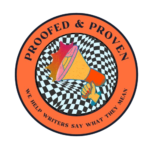Why bother?
You’ve spent years researching and writing your dissertation—but who besides your committee will ever read it?
Turning your dissertation into a book usually requires big-time revisions, which you may not have the resources, time, or know-how to undertake. Especially if you were busting your behind to get your dissertation done in the first place, you may not even want to look at the thing again. If that’s you, take a deep breath; take a step back; and come back to it with a new arsenal of tools (and an editing professional on your team).
Many scholars struggle to make their research accessible beyond academia. An alternative project you could take on (and make money from) is to chop up your dissertation into short-form content to sell as study guides or articles on your topic (on Amazon or Smashwords). After all, if there’s anyone out there who can talk about your topic for days, it’s you. And who doesn’t like a little passive income?
But that’s not what this article is about. This post will show you how to transform your dissertation into a marketable book that reaches a wider audience and boosts your credibility. Your book is your business card; hand that sucker out!
Signs You Should Turn Your Dissertation into a Book
You should drop everything and work on this book if…
- You’ve garnered interest from a publisher or editor who is willing to work with you on the book. When a professional speaks, you listen!
- You’ve moved from surviving → thriving. As in, you’re no longer gasping for air in your academic career. If you’ve got tenure or another stable researching/teaching position, you may be able to afford the time to convert the thesis into a book. It’ll help if your thesis was already book-like or used language easily accessible to a wide audience.
- You specialize in an area that people generally like to read. For instance, history books are popular beyond the academic crowd; self-help and entrepreneurship books fly off the shelves; and topics such as diversity, equity, and inclusion are more important than ever to keep on the forefront of the cultural conversation.
Essentially, you have to ask yourself, “What makes me different from every other [insert subject here] PhD student?” And if you have a unique value proposition, then you should be good to go.
Some more signs you should put the effort in to publish your thesis:
- You speak at conferences;
- You’re recognized as a leading expert in your field (however niche);
- You publish articles regularly (either on a website, your personal blog, or in peer-reviewed journals);
- You have name recognition through social media, publishing credits, or other publicity efforts.
Now is not the time to suffer Impostor Syndrome. If you got your doctorate, you can do anything! When you’re bogged down with fear and doubt, think about the “why”: A book can boost your career, open doors to job opportunities, speaking engagements, and media coverage. Your research shouldn’t sit unread in a university archive. Breathe life into it and let it live!
How to Restructure It for Readability
One of the major differences between your dissertation and a book on the same topic is your audience. In the words of the great Simon Sinek, “start with why.” When you were writing your dissertation, whatever your personal motives were, your writing goal was to impress a small cadre of intense academics who had a number of reasons to grill you (some of which are unclear, in hindsight): boosting the credibility of their university, implicit bias towards you or your topic, helping you advance your career, or to uphold the ivory tower (hello, heavy jargon).
However, the audience for your book is likely wider; it might be students studying your topic in depth, laypeople with an interest in your topic, or professionals who utilize research like yours in their everyday projects. Books such as The 7 Habits of Highly Effective People by Stephen R. Covey started out as PhD work.
Tip #1: Trim the excess: Remove overly technical jargon, dense lit reviews, and unnecessary methodology details. If you’re unsure if you’re doing this right, ask a friend or acquaintance with no familiarity with your subject if it makes sense to them. If you’re appealing to the masses, then you’re aiming for an 8th-grade reading level. Basically, the average American adult should be able to comprehend a sentence without having to read it a second time.
Tip #2: Find the story: Make your research compelling with a clear narrative arc. For instance, if you’re writing about the disappearance of glow worms in caves in Australia, create a timeline of discovery: what sparked your interest in the topic, why you decided it was worth pursuing, anecdotes from any field work you carried out, and an appeal to a broader sense of connection with your reader (it can be silly, too, like harkening back to the Glowworm in James and the Giant Peach)
Studying glow worms “is the life for me.
Tip #3: Reorganize for accessibility: Chapters should flow logically for a general audience, not just experts. This can be a hard one, but it’s where your dissertation will come in handy. If it ain’t broke, don’t fix it. Keeping your audience in mind, though, you may have to add background information and take away technical content in order to reach your ideal reader. When in doubt, ask for feedback from a beta reader or editor.
Where and How to Publish
Again, the question of where and how to publish comes back to your intended audience. Here is what sets different publishing mediums apart:
Traditional publishing: University presses vs. trade publishers—what they look for.
University presses keep your work in the realm of academia; your audience is primarily focused on research and in-depth analysis. Think peer-reviewed studies, specialized vocabulary, prioritizing intellectual merit over large sales figures (a smaller target audience).
Traditional publishers prioritize books with a broader appeal to the general public. If your manuscript is easily readable and engaging rather than highly specialized and technical, this is a good route for you to take. This is also a better route if you’ve authored books before, have a strong following on other platforms, align with popular genres (fiction, memoir, or self-help, to name a few), or have the potential for high sales.
Self-publishing can be more or less of a headache, depending on a bunch of factors. Whichever way you sell your book, you’re going to have to start looking at yourself as a business owner, which has a steep learning curve. But the benefits of self-publishing are: control over your work, faster turnaround, and higher royalties.
Good news is, there are a lot of free resources to self-publish; it’s up to you to pursue them. But hey, you’re a self-starter; you’re a doctor!
Hybrid publishing: This is a middle ground for academics who want professional production but more control. In this model, you pay for a la carte services (editing, marketing, formatting, etc.), and the hybrid press publishes you under their imprint. Some reputable hybrid presses (not to be confused with “vanity presses”) include Quill Hawk Publishing, Forbes Books, and She Writes Press. When in doubt, check out the Independent Book Publishers Association for details.
Conclusion: Your Research Deserves a Wider Audience
You didn’t spend years on your dissertation just for it to collect dust in an archive. With the right approach, you can transform your work into a compelling, accessible book that reaches more readers, builds your credibility, and even generates income. Whether you’re looking to land speaking engagements, establish yourself as a thought leader, or simply share your hard-earned knowledge with a broader audience, publishing your dissertation as a book is a powerful next step.
The process might seem overwhelming, but you don’t have to do it alone. From refining your manuscript for readability to navigating the publishing landscape, expert guidance can make all the difference. If you’re ready to turn your research into a marketable book, Proofed & Proven is here to help. Let’s get your work out into the world—because your ideas deserve to be read.
Need an editing professional to help you shape your dissertation into a book?


